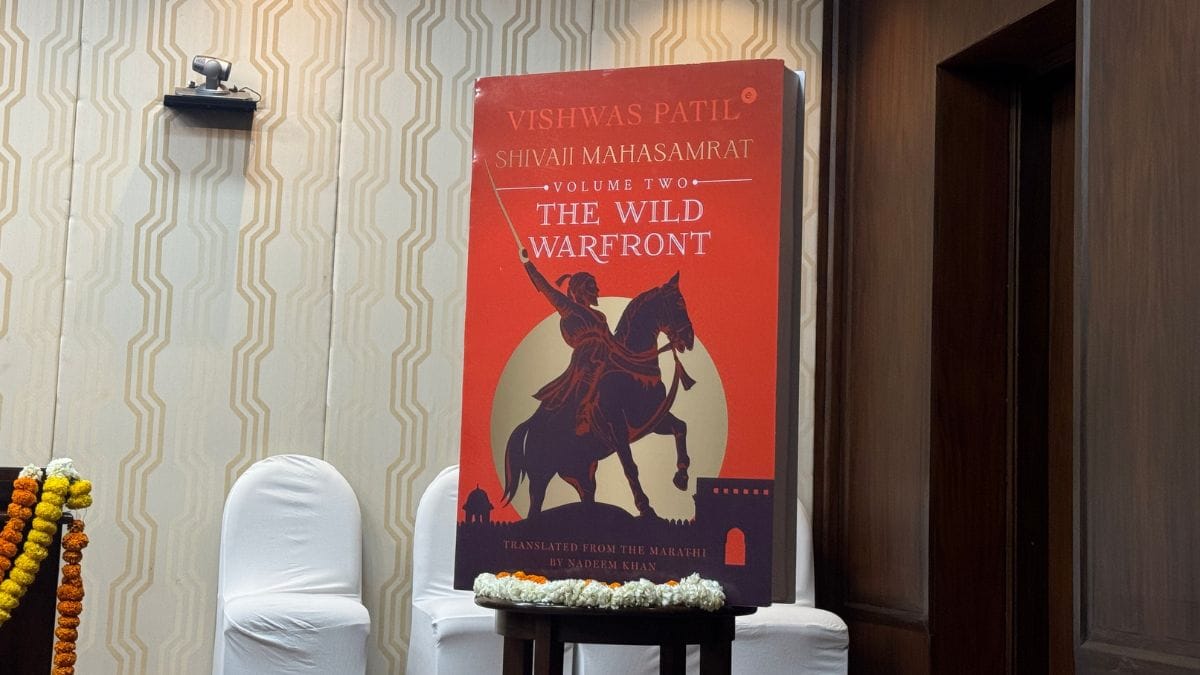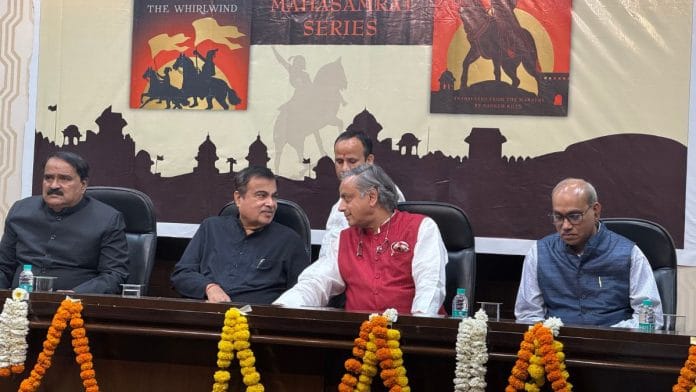New Delhi: Chhatrapati Shivaji Maharaj was a secular leader. While he was a warrior and a nationalist at the core, he also had great respect for other religions. When Afzal Khan, a general of the Bijapur Sultanate, was killed, Shivaji ordered that his grave be prepared with respect near the fort Pratapgad. That’s the nugget of history Union minister Nitin Gadkari chose to share about Shivaji at an event in Maharashtra Sadan on Wednesday.
“These days, the word secular is very popular. But its meaning is not dharma-nirpekshata (religious neutrality). In the English dictionary, its meaning is sarva dharma samabhav (equal respect for all religions). And Shivaji Maharaj was an ideal king—100 per cent secular,” Gadkari said. His words drew a round of applause from the audience.
He was speaking at the launch of The Wild Warfront, a book on Chhatrapati Shivaji written by Sahitya Akademi Award-winning Marathi author Vishwas Patil and translated into English by Nadeem Khan for Westland Books. A distinguished panel featuring Gadkari, Shashi Tharoor, and K Sreenivasarao inaugurated the book.

Armed with years of in-depth research, Patil has meticulously recreated the life and times of Shivaji in this book. It is the second volume of his magnum opus, The Shivaji Maha Samrat Quartet. The first in the series was Zanzavat (The Whirlwind).
While working on the books, Patil visited 250 forts over 35 years.
“Many of my friends ask me a question: What was the real dharma of the father-son duo, Shivaji and Sambhaji? My answer is straightforward. While they were born into Hindu dharma, they embraced the dharma of the world and took their last breath waving the flag of universal human dharma,” Patil said as the audience—made up of mostly Marathi people—cheered.
Rajinikanth loves Shivaji
Gadkari was the first to speak at the event. He apologised for having to leave early, as Prime Minister Modi had asked for his presence in Parliament. However, since the book was about his favourite Indian ruler, he made it a point to attend, even for 15 minutes.
The Lok Sabha MP recalled how he would attend plays and cultural events as a child to hear stories of Shivaji’s bravery. “It felt like we were witnessing the wars unfold before us. The storytelling was so powerful,” he said.
Gadkari went on to share a memory of meeting superstar Rajinikanth at the actor’s residence in Chennai. Outside the room hung a massive portrait of Shivaji. Curious, Gadkari asked Rajinikanth how, despite living in Tamil Nadu, he had such a grand portrait of the Maratha king.
“Rajinikanth responded by saying that Shivaji is in his heart. This is what Shivaji was—someone who inspired everyone,” he said with a smile.
Gadkari lamented that the stories of Shivaji’s valour, chivalry, and just rule remained largely confined to Maharashtra. However, he saw a ray of hope in Khan’s English translation of Patil’s book.
“I am very happy because, with this English translation, the book will now reach the Western world. As a devotee of Shivaji Maharaj, I must say that I am very thankful,” Gadkari added.
Also read: Ambedkar to Sai Baba—an exhibition blends art and academia to honour India’s saints
Novelisation of history
Shashi Tharoor described Patil’s book as “novelisation of history”. He added that it was no easy task to produce such a text in India, where people are easily offended by the smallest things.
“But Vishwas Patil has been able to pull it off. He took the events and characters of the past and humanised them through the medium of fiction,” Tharoor said.
The Rajya Sabha MP went on to congratulate Khan for translating the book, adding that to render such a “complex, dense, and lengthy novel” into accessible and readable language was a remarkable job.
“I must say that Vishwasji is lucky with his translator. I would say only in the last 10 or 15 years have Indian publishers truly been able to give us volumes of Indian literature in English that reads very smoothly for a native English speaker,” said Tharoor as Khan looked at him with folded hands.
Like Gadkari, Tharoor also mentioned Shivaji’s respect for other religions by sharing a historical anecdote. The king gave instructions to his soldiers that after any of these conquests, if they came across a copy of the Quran, they should treat it with respect until they found a Muslim person to hand it over to.
“Such were the values that Shivaji imparted. And his legacy has varied interpretations even within Maharashtra. For Jyotiba Phule, he was the voice of the underclass. Bal Gangadhar Tilak saw him as an original Hindu nationalist,” Tharoor said.
Before Gadkari left the event, he shared a personal detail. His office has only one portrait, and that is of Chhatrapati Shivaji Maharaj. The audience erupted in whistles, cheers, and applause.
(Edited by Prasanna Bachchhav)






